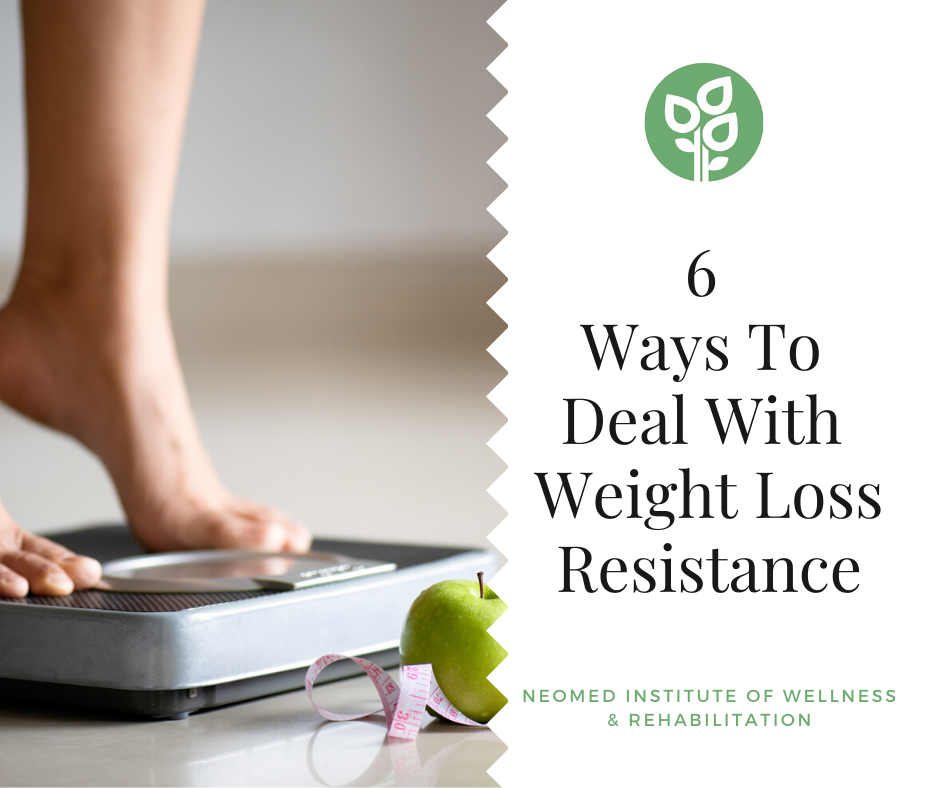6 Ways to Deal With Weight Loss Resistance

Reasons we cannot lose weight
Refined, nutrient-depleted food
Many people who go on diets to lose weight usually turn to low calorie processed foods to get them through the process. Unfortunately, choosing processed foods, even though low in calories, does not provide the cells of our body with the fuel it needs to produce energy. Our mitochondria or our energy-producers are nutrient hogs that need massive amounts of nutrients such as coenzyme Q10, magnesium, iron, b-complex vitamins, lipoic acid, and more to burn fat for energy. If we eat a low-calorie diet from fake food, it is no wonder why we will not see the scale move in the right direction any time soon.
Total Toxic Burden
There is research that shows one of the leading causes of issues like insulin-resistance (which by the way is a huge reason for people being unable to lose weight efficiently), its toxicity. To give an idea of how many toxins we are exposed to daily, think about all the toiletries one may use in a given day. The average woman may use over 200 chemicals on her skin before she leaves the house in the morning! If you are exposed to many toxins, you put pressure on your liver to detoxify. If you do not eat a nutrient-dense diet to support detoxification pathways, you put pressure on your liver, your body becomes more inflamed, and the result is difficulty in losing weight, no matter how hard you try.
Dysfunctional Digestion
You always hear the cliché, you are what you eat. But the truth is, you are what you absorb. If you have issues like GERD (reflux), bacterial or fungal overgrowths in the small intestine, parasites, or a leaky gut, chances are you are not getting the right amount of nutrients needed to support mitochondrial energy production or proper detoxification. This is definitely a problem that needs to get sorted if you want to see the scale start moving in the right direction.
Food Intolerances
Insensitive people, eating foods that can cause inflammation, even in small daily doses, can cause them to have weight loss resistance. When food causes inflammation within the body, it does not allow for energy to be produced efficiently, therefore decreasing one’s ability to lose weight.
Stress
Chronically high levels of cortisol, one of our stress hormones, shuts down the body’s ability to metabolize nutrients, thus making it harder to lose weight. If you are one of those people who is wound tight most of the day, does not sleep enough, and worries all the time, chances are you will not be able to lose weight until you calm down, practise stress-reduction techniques, and work on getting quality sleep.
Decreased Thyroid Function
Thyroid hormones are needed for every cell in the body to work optimally. If you are deficient in thyroid hormones or you are thyroid hormone resistant (which means your cells are blocking thyroid hormones from getting in and doing their job), then it will be challenging for weight loss to happen.
Iron-Deficient Anemia
In order to produce energy, one needs oxygen. In order for oxygen to get into the cells, one needs iron. If one is deficient in iron, they are depleted of optimal amounts of oxygen, feel less energy, and their cells are not able to metabolize as they should in order for one to lose weight. This is definitely a condition that needs to be corrected if you want to lose weight.
So, how do we actually lose weight when there are all these issues to consider?
6 Ways to deal with weight loss resistance
-
Try a Detox Protocol
Being that the liver is very important to the detoxification process, it is very important to support its functions through specific supplementation and a nutrient-dense diet. You can start with a plant-rich, low to a moderate fat diet that includes vegetables from the colour of the rainbow daily. Foods especially helpful to liver health come from cruciferous vegetables like broccoli, cauliflower, Brussel Sprouts, or other sulfur-producing veggies like onions and garlic. To support the liver with supplements, you can work with a functional medicine practitioner or a naturopath to use supplements such as n-acetyl-cysteine, milk thistle, artichoke, or glutathione. To support the detox process, you can also use supplements such as liposomal vitamin C and an antioxidant blend from phytonutrients like resveratrol or quercetin. It is important to mention that no detox protocol can be effective if you suffer from issues such as constipation. For tips on how to deal with this issue, click here (link to constipation article). -
Eat real food
There are many theories on how to eat, however, research cannot deny the importance of eating a nutrient-dense diet from real food. Avoiding inflammatory foods such as sugar, refined grains, and processed foods is key to starting the process of losing weight. -
Improve Your Digestion
You can work with a functional medicine practitioner to optimize your digestion by using specific supplements based on your digestive issues. If you feel bloated after most meals, your practitioner may suggest enzymes. If you have overgrowths, your practitioner may use killing herbs to address the overgrowths. It is important to address your digestive issues to make sure you are absorbing the nutrients that are essential for weight loss. -
Decrease Your Stress Levels
Many would say that this is easier said than done. However, it is crucial to do if you want to lose weight. Try to improve your sleep so that you are getting 7 to 8 hours of quality sleep each night. Eat more protein and fat in the morning and some healthy carbs like pumpkin or squash at dinner to improve cortisol levels. Try not to be sedentary and try to move daily. Practice gratefulness daily. Some supplements you can ask your functional practitioner about to help address too much stress are phosphotidylserine, rhodiola, and ashwaganda. -
Balance Your Hormones
Check with your doctor to make sure your thyroid hormone levels are optimal. Remember, optimal means that your thyroid hormone levels should be high normal to be optimal. For your TSH levels (Thyroid Stimulating Hormone, the most common measure of thyroid function), should be between 1 and 2 mIU/L. -
Try Intermittent Fasting
This means not eating for 12-16 hours of a 24 hour day. Fasting has been proven to balance blood sugar levels, decrease insulin resistance, and increase the activity of mitochondria (therefore improving metabolism). This is not necessarily for everyone, therefore, if you are the kind of person that gets dizzy after only 3 hours without eating, intermittent fasting is not for you until you address this issue.
Key points to remember
-
Live a cleaner lifestyle free of toxins and processed foods.
-
Eat a nutrient-dense and plant-rich diet.
-
Use supplements that help to support the liver and the detox process.
-
Check your thyroid hormones to make sure they are helping your metabolism to work.
-
Try Intermittent Fasting to help boost mitochondrial and metabolic health.
Article Author: Tina Christoudias Spyrou, Dietician and Functional Medicine Practitioner
To book a consultation to discuss your weight concerns and how our clinic can help you please use the form below:







